1. Overview
Gabriele "Gaby" Seyfert, born on November 23, 1948, is a German former figure skater who rose to international prominence representing East Germany. She is celebrated for her significant contributions to the sport, particularly for being the first woman to successfully land a triple loop jump in competition. Seyfert achieved notable success throughout her career, becoming a two-time World Champion in 1969 and 1970, and securing a silver medal at the 1968 Winter Olympics in Grenoble. Her career was closely intertwined with the unique sociopolitical landscape of East Germany, which influenced both her athletic pursuits and her post-competitive life. Following her retirement from competitive skating, Seyfert pursued various professional endeavors, including coaching, translation, and managing an ice ballet, while navigating personal life milestones such as marriage and motherhood.
2. Early Life and Family
Gabriele Seyfert was born on November 23, 1948, in Chemnitz, which was then part of the Soviet occupation zone of Germany. She was the only child of Wolfgang Seyfert and Jutta Müller, a former ice dancer who later became a world-renowned figure skating coach, notably coaching figures such as Katarina Witt. Jutta Müller also served as Gabriele's primary coach throughout her distinguished career.
3. Figure Skating Career
Gabriele Seyfert's figure skating career was marked by groundbreaking technical achievements, consistent international success, and intense rivalries, all unfolding within the specific context of East German sports.
3.1. Early Career and Breakthrough
Seyfert began her figure skating journey at the SC Karl-Marx-Stadt club, where she represented East Germany. Under the tutelage of her mother, Jutta Müller, Seyfert quickly developed into a formidable competitor. Her early career saw her make significant strides, and by 1966, after earning silver medals at both the European Championships and the World Championships, she was recognized as the "GDR female athlete of the year." A pivotal moment in her career, and in the history of figure skating, occurred when she became the first woman to successfully land a clean triple loop jump in competition, a testament to her technical prowess and pioneering spirit.
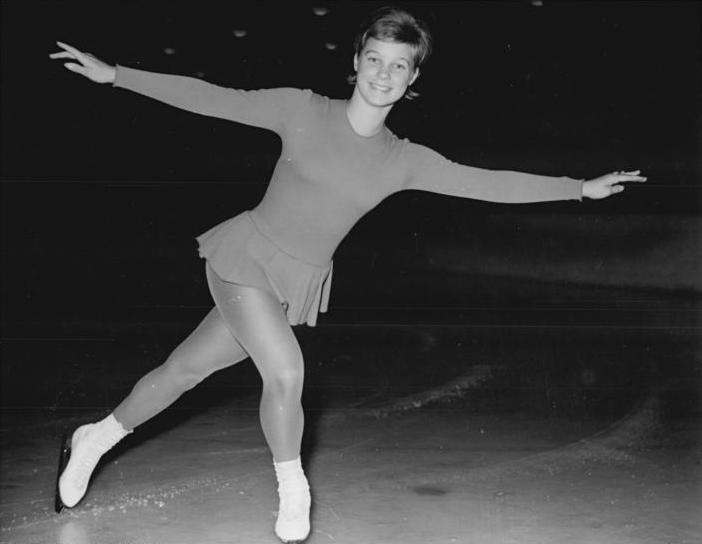
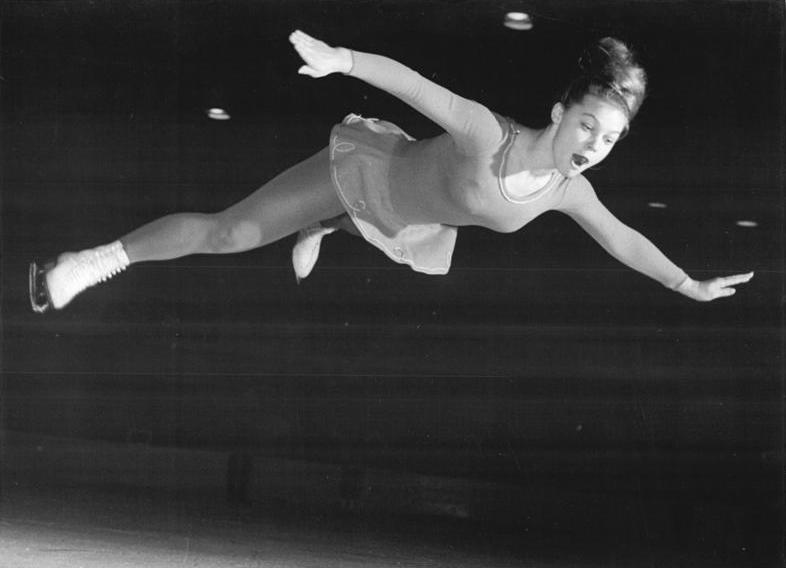
3.2. Major International Competitions and Rivalries
Throughout her competitive career, Gabriele Seyfert consistently performed at the highest levels of international figure skating. She secured a silver medal at the 1968 Winter Olympics in Grenoble. In the World Championships, she achieved remarkable success, winning gold medals in 1969 and 1970, and silver medals in 1966, 1967, and 1968. At the European Championships, Seyfert was a three-time gold medalist in 1967, 1969, and 1970, in addition to earning silver medals in 1966 and 1968.
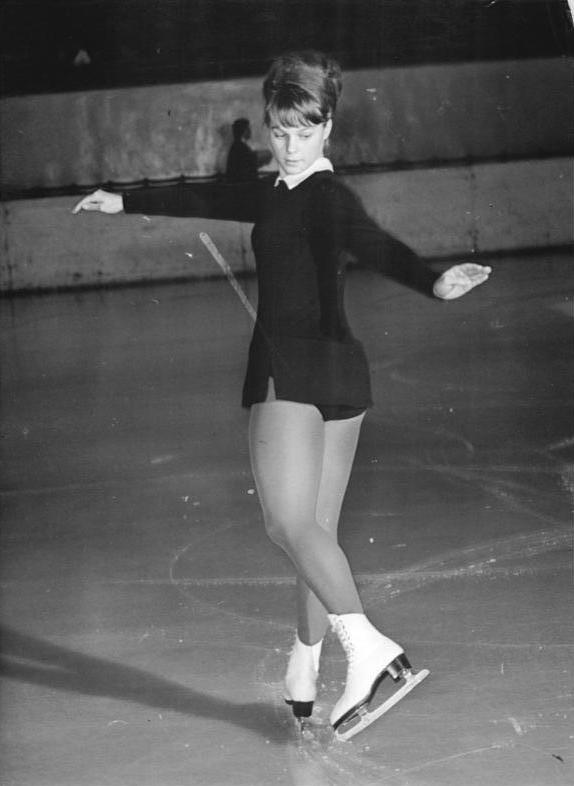
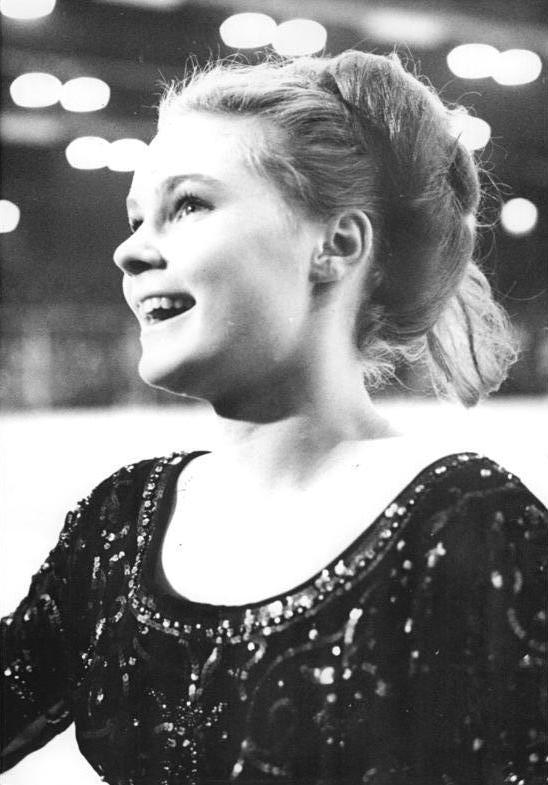
A prominent feature of her competitive years was her long-standing rivalry with American skater Peggy Fleming. Despite their numerous encounters on the international stage, Seyfert never managed to defeat Fleming in competition.
3.3. Retirement and Post-Competitive Restrictions
Gabriele Seyfert concluded her competitive figure skating career in 1970. Unlike many of her counterparts from Western countries, such as her rival Peggy Fleming, Seyfert was not permitted to transition into a professional skating career. Offers from renowned ice shows like Holiday on Ice were explicitly refused by the East German authorities, who strictly controlled the professional pursuits of their athletes. This restriction significantly limited her post-competitive opportunities within the field she had excelled in.
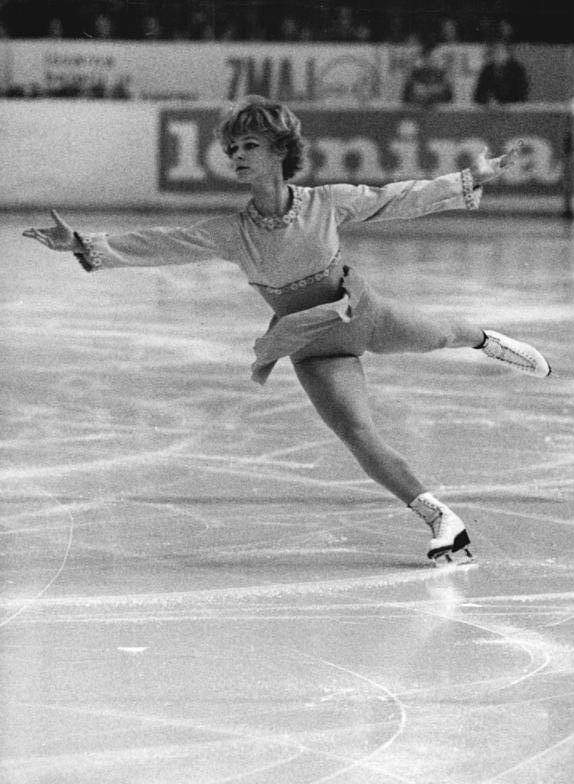
3.4. Stasi Involvement
It has been documented that Gabriele Seyfert was an informer for the Stasi, the official secret police of East Germany. She operated under the codename "Perle." This involvement is a factual aspect of her life within the historical context of the German Democratic Republic.
4. Post-Skating Activities
Following her retirement from competitive figure skating, Gabriele Seyfert engaged in a variety of professional and personal endeavors, adapting to the constraints and opportunities available in East German society and later in reunified Germany.
4.1. Coaching
In the early 1970s, Seyfert briefly ventured into coaching. She notably worked with Anett Pötzsch, who would later become an Olympic champion. However, her coaching career was short-lived. The East German coaching hierarchy ultimately transferred Pötzsch to her mother, Jutta Müller's, coaching group, leading to the end of Seyfert's formal coaching activities.
4.2. Other Professional Pursuits
After concluding her coaching stint, Gabriele Seyfert diversified her professional paths. She pursued higher education, studying languages at a university, and subsequently worked as a professional translator. From 1985 to 1991, she held a leadership position, directing the ice ballet at the Friedrichstadt-Palast in East Berlin. During this period, she also occasionally participated in the performances as a skater herself. After the ice ballet program at Friedrichstadt-Palast was discontinued, Seyfert transitioned to working in a service industry business located in Berlin. She currently resides in Berlin-Karow.
5. Personal Life
Gabriele Seyfert's personal life has seen several significant changes. She married ice dancer Eberhard Rüger in 1972. Together, they had a daughter named Sheila, who was born in 1974. Following this marriage, Seyfert later married Jochen Messerschmidt. In 2011, she entered her third marriage, to Egbert Körner.
6. Competitive Results
| International | ||||||||||
|---|---|---|---|---|---|---|---|---|---|---|
| Event | 1960-61 | 1961-62 | 1962-63 | 1963-64 | 1964-65 | 1965-66 | 1966-67 | 1967-68 | 1968-69 | 1969-70 |
| Winter Olympics | 19th | 2nd | ||||||||
| World Champ. | 21st | 5th | 2nd | 2nd | 2nd | 1st | 1st | |||
| European Champ. | 21st | 12th | 10th | 5th | 2nd | 1st | 2nd | 1st | 1st | |
| Prague Skate | 2nd | |||||||||
| Blue Swords | 1st | 2nd | 1st | 1st | 1st | 1st | ||||
| National | ||||||||||
| East German | 1st | 1st | 1st | 1st | 1st | 1st | 1st | 1st | 1st | 1st |
7. Legacy and Assessment
Gabriele Seyfert's legacy in figure skating is complex, encompassing her significant athletic achievements and her life experiences within the sociopolitical framework of East Germany during the Cold War.
7.1. Contributions to Figure Skating
Seyfert's impact on figure skating is undeniable. Her pioneering achievement of successfully landing the first triple loop jump in competition pushed the boundaries of technical difficulty in women's figure skating. This innovation not only showcased her individual skill but also contributed to the overall advancement of the sport. Furthermore, her consistent success on the international stage, including multiple World and European titles, significantly elevated the profile of East German figure skating. Her rivalry with Peggy Fleming captivated audiences and highlighted the competitive spirit that defined the era, making her a prominent figure in the sport's history.
7.2. Historical Context and Controversies
Gabriele Seyfert's career unfolded entirely within the German Democratic Republic (East Germany), a state characterized by its authoritarian system and strict control over its citizens, including its elite athletes. While the East German state provided extensive support and resources for athletic development, it also imposed severe restrictions on personal freedoms and professional opportunities, as evidenced by Seyfert's inability to pursue a professional skating career internationally. This environment created a unique set of challenges and opportunities for athletes like Seyfert, who often became symbols of national prowess under strict state supervision.
A notable aspect of her historical context is her documented role as an informer for the Stasi, East Germany's secret police, under the codename "Perle." The Stasi was widely known for its pervasive surveillance, suppression of dissent, and human rights abuses. Seyfert's involvement, like that of other individuals who collaborated with the Stasi, reflects the complex ethical and societal pressures prevalent in the GDR. While the full extent and nature of her activities as an informer are part of the historical record, it highlights the moral compromises and difficult choices individuals faced under such a regime. Understanding her life requires acknowledging both her remarkable athletic achievements and the intricate, often troubling, political realities that shaped her existence in East Germany.
8. Works
Gabriele Seyfert has authored several books reflecting on her life and experiences:
- Da muss noch was sein: Mein Leben - mehr als Pflicht und Kür (1998)
- Auf Wolke eins ist immer Platz. Single sucht Single (2000)